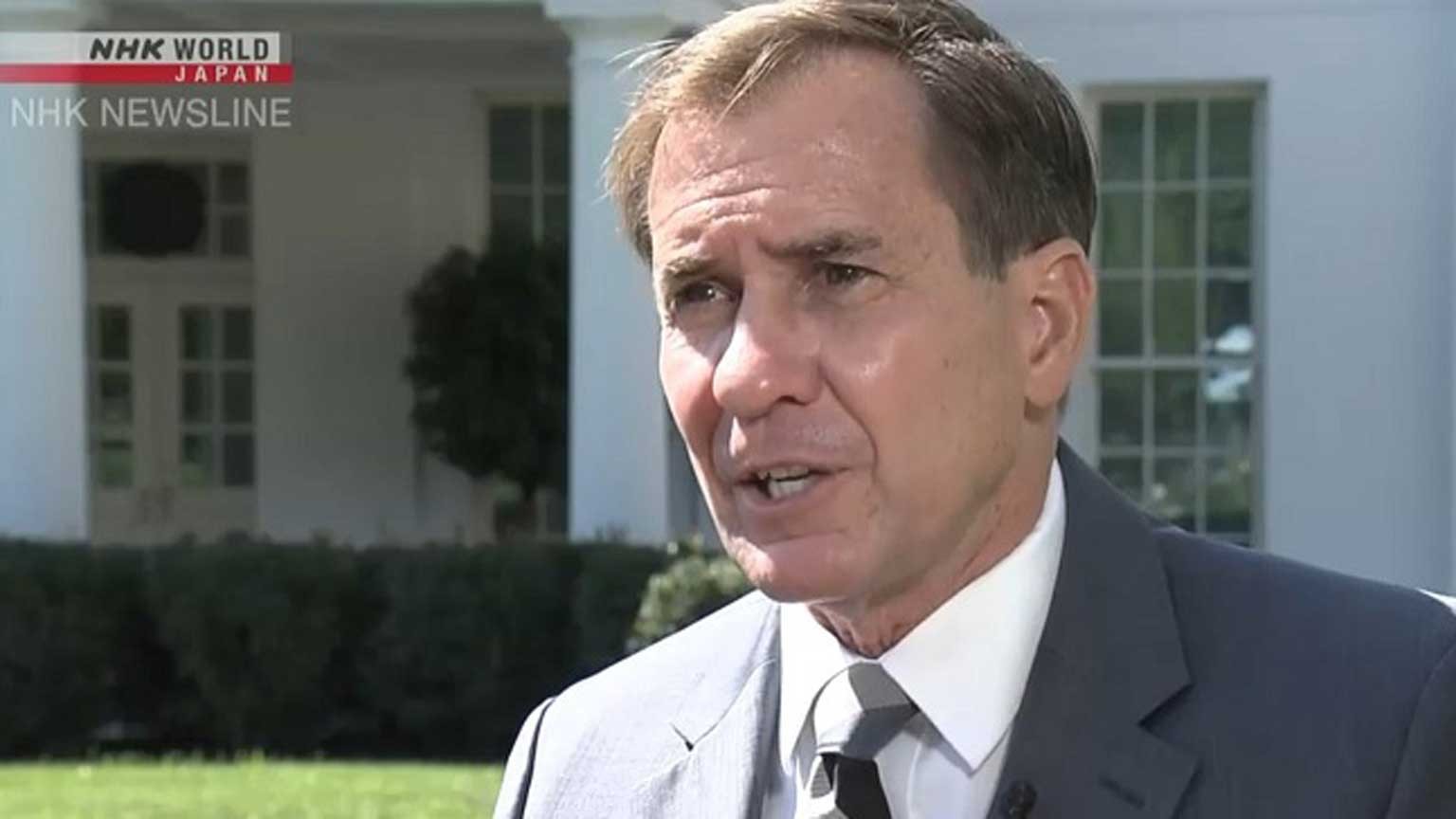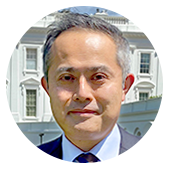Takagi Masaru: President Biden has selected the historic Camp David, the venue for the upcoming trilateral summit. Can you briefly describe President Biden's personal involvement, including during the Obama administration, in improving the bilateral relationship between Japan and South Korea? Does he harbor any personal attachment or feelings to the trilateral meeting?
Admiral John Kirby: President has focused very, very keenly on the Indo-Pacific since day one of this administration. First two foreign leaders that he had here at the White House were representatives from South Korea and Japan. That's how much it matters to him.
The first trip Secretary of State Antony Blinken and Defense Secretary Lloyd Austin took overseas together was to South Korea and Japan and so what you're seeing here tomorrow at Camp David is really a culmination of months and months — a couple of years plus effort by President Biden to really prioritize the Indo-Pacific region and more specifically to prioritize these relationships that we have with Japan and South Korea. And of course, to continue to encourage Japan and South Korea to deepen their cooperation and their trust and confidence in one another, which has happened.
And one of the things that's going to be, I think, clearly on display tomorrow is the degree to which Japan and South Korea really are moving in a new direction. This is a historic time in these relationships, and there's just so much more opportunity available to us.
Takagi: How about President Biden’s personal attachment to this trilateral diplomacy?
Kirby: The President values greatly his personal relationships with President Yoon and with Prime Minister Kishida, and he certainly values the relationship that President Yoon and Prime Minister Kishida are forming together. For the President (Biden), all diplomacy is personal, and relationships are really the engine that makes diplomacy work. The President invests much time in this, particularly in that part of the world. And again, so he's very personally attached to making sure that this trilateral relationship continues to improve, and our cooperation continues to deepen. He's also of course personally invested in making sure tomorrow's summit produces real tangible results and initiatives that will be able to be sustained over the long term.
Takagi: China has voiced criticism, contending that the US is seeking to forge a new "Asian NATO" by promoting security configurations like Quad and AUKUS and perhaps even a US-Japan-ROK trilateral alliance. So, how do you respond to such criticism?
Kirby: I'd say a couple of things. First of all, what we're doing in the Indo-Pacific with the Quad, with AUKUS, with the summit tomorrow, and the trilateral cooperation that we continue to try to pursue with Japan and South Korea, is about making a secured, prosperous, and peaceful Indo-Pacific.
It's not about any one country. It's not about any challenge or threat. There's a myriad of challenges and threats in the region. And that's why the President wants to put in place frameworks that will allow us to address those threats and challenges in a multilateral way with many countries involved. This is not about the PRC, it's not even about the DPRK, it is about a peaceful prosperous Indo-Pacific and what we can all do to achieve that. If China was really interested in a peaceful prosperous Indo-Pacific, then they should see that first and foremost.
Takagi: The Biden administration is currently trying to strengthen regular dialogue with China. On the other hand, you just announced new restrictions on US investments in China. As a result, Japan and other Asian nations have had a difficult time deciphering US policy toward China. How does the US want to manage its relationship with China? And how does the trilateral relationship come into play to achieve these objectives?
Kirby: We're seeking competition with China, a competition that the President believes that the United States is well positioned to succeed in, as well as our allies and partners in South Korea and Japan.
We don't want conflict with China. We're not trying to escalate the tensions. Everything we're doing is to try to bring those tensions down. And that means that we have to look for ways where we can cooperate with China such as climate change, for instance. But it also means we can't be afraid, if it is a competition, to take the steps we need to make sure that we're in the best position to preserve that competition, and just as critically, reserve our national security interest as we seek to compete.
This executive order that the President signed a week or so ago on outbound investments is really limited and narrowly defined on specific technologies that affect our national security. We're not decoupling from China, but we are wanting to de-risk.
Takagi: On extended deterrence, while bilateral consultative mechanisms do exist between the US and Japan, and the US and the ROK, a trilateral-making mechanism still does not. Is the US considering extending this into a trilateral format now or in the near future?
Kirby: I'm not going to get ahead of the summit tomorrow. But I do think you will see a discussion tomorrow about strategic deterrence, and about the need for all of us to stay in close consultation with one another.
Takagi: Are you interested in the trilateral discussions on extended deterrence?
Kirby: We are interested in improved trilateral coordination and communication on all deterrence including strategic deterrence.
Takagi: Historically, trilateral gatherings involving the US, Japan, and ROK have conventionally been a forum for discussions regarding the DPRK. However, Secretary Blinken said this week that the Camp David meeting will mark a new era of a trilateral relationship. How will this meeting deepen and develop trilateral ties moving forward?
Kirby: You're going to see coming out of this summit tomorrow, a series of initiatives, some in the security framework, some on economic involvement in investment, people-to-people ties, diplomacy, you're going to see a whole spate of initiatives that come out of this summit, which will prove how serious the United States is deepening our trilateral commitment but just as critical, how committed we are to deepening that trilateral cooperation for the long haul.
We're going to set in place a series of discussions and events and collaboration that will take us well into the future and anyone who is interested in a peaceful prosperous Indo-Pacific. It will be difficult for them to take a look at these initiatives and not be able to be convinced that we are very serious about these commitments and again for long into the future.
Takagi: What are the keys to institutionalizing this trilateral format, not going back to the previous situation?
Kirby: Because we're going to put them in place in a central way, in a framework, and you're going to see this tomorrow, that clearly has long-range goals at its root and foundation.
Now look, I can't be perfectly predictive. We're three democracies, so you can't be perfectly predictive about what those democracies are going to look like in five or 10 years. But that's not the point. It would be difficult for anyone who cares about the Indo-Pacific and cares about these alliances to take a look at what we're going to announce tomorrow, and not see that they should be sustained for the long-term.

